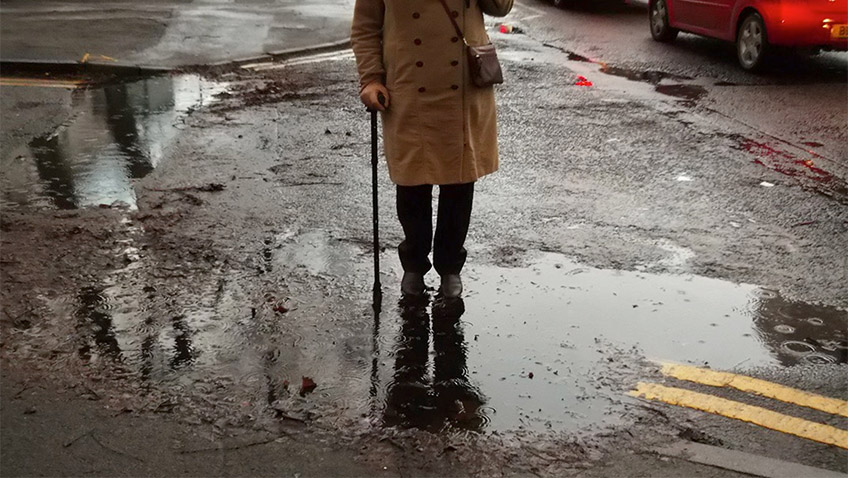Nearly one in three older adults (aged 65+) are prevented from walking more or at all on their local streets because of cracked and uneven pavements. This astonishingly equates to over 3.5 million people in the UK.
These are the results of a YouGov survey from Living Streets, the UK charity for everyday walking, that have been released for National Walking Month. This has found that cracked and uneven pavements, obstructions on pavements including pavement parking and people driving too quickly were the top three things preventing people aged 65+ from walking more or at all.
The new research found that half of older adults would walk more if their pavements were well-maintained, there were lower speed limits or more places to rest.
Air pollution also presented a concern with one in five older adults being worried about the air quality on their local streets and over one in ten being prevented from walking more because of it; this was even higher in London where one in four older adults in the capital are put off walking more or at all because of air pollution.
Getting exercise, simply leaving the house and fresh air were the top three things that older adults enjoyed about walking on their local streets.
1.4m older adults are lonely, with Age UK predicting this will rise to 2m within seven years. People over 50 are more likely to be lonely if they’re widowed, in poor health or feel like they aren’t part of their local community.
The UK government’s loneliness strategy recognises the importance of older adults staying active and social through walking activities. Living Streets is calling for streets to be improved to facilitate this.
Local councils currently invest around 12 per cent of their local transport infrastructure funding on walking and cycling. Living Streets wants to see this increased to at least 15 per cent.
The charity is calling for councils to remember pavement potholes when repairing their roads to enable the most vulnerable to feel happier and safer using their streets. It’s part of Living Streets’ #nine90 campaign which aims to highlight the need for streets to be designed with nine-year olds and 90-year olds in mind, as then they become accessible to everyone.
Joe Irvin, Chief Executive, Living Streets said: ‘Loneliness is one of the biggest social challenges of our age. Walking regularly can be an antidote to isolation – helping to reduce the risk of depression and dementia.
‘If we all viewed our streets through the lens of an older adult – or a child, a wheelchair user or someone living with sight loss – we would soon begin to understand how unfit for purpose a lot of them are.
‘Having well-maintained and clear pavements would help older adults walk more. We want local authorities to be reassessing their streets and seeing how they could be made better for people aged nine and 90 – and therefore better for everyone.’
Kate Humble, television presenter, author and National Walking Month ambassador said:
‘Walking doesn’t have to be about climbing mountains; you can get just as much from a walk around your local town.
‘What does make a difference is having a town which feels safe to walk in – whether you’re nine or 90. If your pavements are a bit cracked, you’re worried about tripping or you don’t have enough benches or good lighting, visit the Living Streets website for information on how you can help improve your local area.’
Living Streets’ National Walking Month takes place during May this year and the charity is urging people to take two minutes to complete an online action urging local councillors to improve and prioritise pavement maintenance.
Find out more at www.livingstreets.org.uk/nwm




